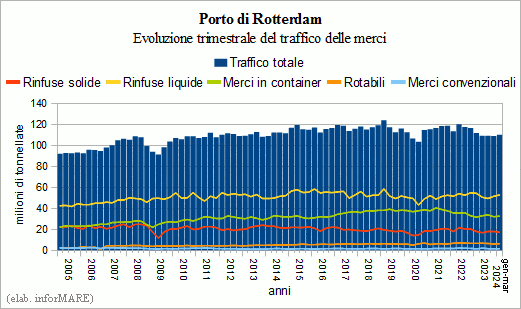
In the first quarter of this year, the Port of Rotterdam
handled 110.1 million tonnes of goods, a decrease of
-1.4% which was contained by the +3.3% increase in traffic
which amounted to 32.5 million tonnes
and was made with a handling of the containers
equal to almost 3.3 million TEUs (+2.0%). In addition, to maintain
The overall decline was limited by the increase, the first
After eight consecutive quarters of decline, the number of goods at the
landings amounted to 33.5 million tonnes (+1.1%). It is
On the other hand, the downward trend in the volume of goods continued
boarding which in the first three months of 2024 resulted in
76.6 million tonnes (-2.5%).
In the first quarter of this year, most of the
other types of cargo, starting with other miscellaneous goods
and 7.8 million tonnes, of which 6.3 million tonnes
of rolling stock (-3.8%) and 1.5 million tonnes of goods
conventional (+7.4%), totalled a decrease of -1.9%. In the
liquid bulk have been handled globally
32.5 million tonnes (-3.1%), including 25.8 million tonnes
tonnes of crude oil (-1.9%), 14.6 million tonnes of
refined petroleum products -3.4%), 3.1 million tonnes of
liquefied natural gas (+3.6%) and 9.2 million tonnes of other
liquid loads (-7.6%). Dry bulk was 17.1
million tonnes (-4.5%), of which 7.2 million tonnes of
minerals and scrap (+16.5%), 5.4 million tonnes of coal
(-27.4%), 2.5 million tonnes of agricultural products (-23.9%) and
2.1 million tonnes of other dry bulk (+93.7%).
"Traffic data," commented the administrator
delegate and chief operating officer of the Port Authority of
Rotterdam, Boudewijn Siemons - show limited imports of
raw materials and exports of finished products. That tells us
whereas European industrial production is still suffering from high
energy prices and low demand from major
sectors that are declining such as construction, the
and the automotive industry. From the growth of the
container traffic - Siemons noted - we see the first
signs of recovery in world trade. However, these timid
Signals remain highly uncertain due to the growing
global tensions'.
With regard to geopolitical crises, the Port Authority
The Dutch Commission has announced that the situation in the Red Sea has
led to a significant reduction in January and February
(-24.5%) in the number of ships in the port of Rotterdam and a decrease in the number of ships in the port of
-13.7% of goods from Asia due to delays and departures
deleted. The Port Authority noted that the change in services
the choice of alternative routes, has led to
supply chain adjustments are needed, while demand for
of goods - specified the Port Authority - is
remained virtually unchanged and now the situation is below
control, with many more ship arrivals in March
(+11.5%) and with the recovery of volumes from Asia and
Positive developments also compared to other world markets. To this end,
- the body specified - a cautious recovery also contributes
economy and the reduction of inventories.
In addition, the Port Authority has specified that this
The change in scenario also led to a strong increase (+29.0%)
feeder traffic from the port of Rotterdam to the ports of
Mediterranean since, with the ships that travel the route
through the Cape of Good Hope instead of that
through the Suez Canal, goods destined for the Mediterranean
are shipped to ports in the region on feeder ships departing from
Rotterdam.
